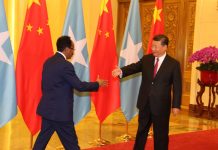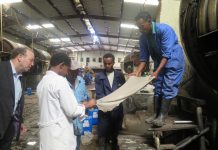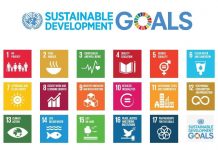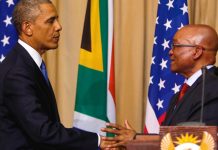If anyone wants further proof that the lines between the developed and developing worlds are dissipating, that in fact even those very descriptors are slowly becoming relics of the past, come to Africa! And so, when MasterCard wanted to champion another frontier in electronic payments, we came to Africa, we came to Nigeria.
We’re uniquely positioned to attest to a Nigeria and an Africa on the vanguard in the payments space as we move from a world of paper money and checks toward a world beyond cash; a world where innovative payment solutions are more efficient, more secure, and more inclusive; a world where new technologies, when harnessed correctly, can lift more boats than ever before.
Our on-soil presence here has improved our collaboration with regulators like your Central Bank; it’s enhanced out hands-on support to merchants, and it’s facilitated our service to the banking industry.
I believe our partnership is emblematic of how global multinationals will succeed in the 21st century, especially in our space. I’ll discuss three organizing principles as I see it that have underpinned our work together and that are critical in carrying the cashless message around the globe, where 85 percent of all transactions are still made in cash.
First, there has to be a public dialogue about the costs of cash and benefits of electronic payments among stakeholders like governments, merchants, and consumers. Second, moving from dialogue to results requires partnerships – public and private partnerships as well as private-private partnerships – that are aligned to create greater efficiencies and shared value. Third, that shared value must foster greater financial empowerment, where opportunities are on the rise, not just for the few, but for the many, and where economic growth is more equitable, sustainable and scalable.
To my first point: As Nigeria well knows, central to jumpstarting this dialogue is reminding people that cash isn’t free. And when it comes to advancing that dialogue, you’re leading it and you’re living it. With your central bank as the catalyst, you’ve taken a bold stand against the pitfalls of cash. You’re focused on modernizing Nigeria’s payment system. You’ve researched the cost of cash extensively and formulated policies to limit its use. You’re encouraging electronic payments by penalizing certain levels of cash withdrawals.
The innovation…the ingenuity…and the public dialogue – all of which are so interwoven into Nigeria’s success story are already spilling over to the continent’s broader economy and creating a template for other African cashless cities and countries. Elsewhere in Africa and around the world, we are working with governments and customers to advance your same agenda.
In South Africa, we are making great strides. They’re virtually eliminating fraud and social grant recipients can now use their debit cards to buy food and goods and get cash back…for the first time. And what began as a debit card has become a payment tool you can reload with funds, making it effectively an alternative bank account. Already, the number of social grant recipients who have a checking or savings account with a bank has risen 15 percent in the last year alone from 60 to 75 percent.
What about the costs to governments to print and distribute money? Last year, the U.S. budgeted some $750 million dollars just to print and deliver money…or the same amount The Gates Foundation put toward The Global Fund last year to fight AIDS, TB, and Malaria!
What about banks and the costs to them of transporting cash from armored trucks to labor-intensive cash handling…there are enormous costs. And when you add the government’s costs to print and deliver money with cash handling costs incurred by banks and merchants – like ATM and branch costs, security, transportation, leakage and reconciliation – as well as opportunity costs for consumers like wait time at ATMs, the costs of cash rises to anywhere between 0.5 to 1½ percent of GDP, depending on the country.
We’re not talking small numbers here. In fact, a McKinsey study cited by The Financial Times estimated that Europe spends 60 billion to 100 billion Euros per year just processing cash payments – printing, transporting, securing…the litany of things I just mentioned. And that 0.5 – 1 ½ percent costs to GDP? That doesn’t include tax evasion, corruption, and other illegal activity!
In fact, MasterCard estimates as much as $16 trillion is spent in cash every year in black and informal economies – cash that is untaxed and untraceable. McKinsey found that corruption costs a country like Brazil some $40 billion, 2.3 percent of GDP or about half its education budget!
And then there’s the impact of cash on other criminal activity. Think about drugs, illegal gun trafficking, money laundering, terrorism, and so forth – all very serious matters. They’re funded by what? Direct debit? Wire transfers? I don’t think so.
Those are some examples of why this dialogue is so critical when it comes to making our case about the benefits of electronic payments as it applies to governments to banks and society at large.
What about making that case to merchants and consumers? Last year, MasterCard conducted our own study of contactless payments like PayPass and found an almost 30 percent lift in total consumer spend within the first year of adoption.
And when I think about consumers, especially today’s generation, cash is about as foreign to them as a rotary phone. This generation is not going to wait to have change counted back to them; they’re not going to fumble around for quarters to pay a parking meter or a highway toll.
And they shouldn’t, not when you have electronic payments that can help you budget your spending and track it, using an itemized purchase record. Not when electronic payments offer security like limited, even zero liability protection that cash can’t. When cash is stolen, it’s gone. Not when electronic payments mean no more ordering printed checks…no more risking bouncing a check or paying overdraft charges.
And just as they do for merchants, electronic payments allow more consumers to participate in the global economy. A consumer with a payments card issued by a bank here in Nigeria can make an online purchase from a merchant in Singapore without ever leaving home!
Promoting this dialogue, working with governments as well as merchants and consumers so they begin to see cash in a new light brings me to my second point about how best to move the needle toward a world beyond cash. Moving from dialogue to results will require partnerships that are aligned to create greater efficiencies and shared value. And nowhere is that more true than here in Nigeria and MasterCard’s relationship with you.
MasterCard has welcomed the opportunity to share global best practices in the electronic payment industry with Nigerian regulators. We’ve provided counsel to your central bank in both the formulation and execution stages of Cashless Nigeria and other e-payment policies. We’ve engaged financial institutional partners, offering best practices again but in this case to help deepen their industry knowledge about electronic payments.
We’ve fully licensed all but five banks in Nigeria with MasterCard principal membership – a collaboration that will increase the capacity for these customer banks to provide greater access to electronic payments. We’ve worked in partnership with Nigerian merchants to organize training with a focus on proper card acceptance, fraud avoidance, and consumer engagement to increase use of electronic payments.
The success here in Nigeria when it comes to partnerships is a model for conducting business in the 21st century. Active engagement, real dialogue, listening…these are the watchwords of good partnership in the 21st century.
At the end of the day, success comes down to creating shared value, which brings me to my third point: That shared value must foster greater financial empowerment, where opportunities are on the rise, not just for the few but for the many…and where economic growth is more equitable…sustainable…and scalable.
Two and half billion people – more than half the world’s adult population – lack access to credit, insurance, savings accounts, and other formal financial services. And nearly 2.4 billion of that number lives in what are still considered developing countries. Nearly 40 percent or 34.9 million of Nigerians are financially excluded.
To Nigeria’s credit, you’re aiming to reduce your financial exclusion rate by half from nearly 40 percent in 2010 to 20.0 percent by 2020. This lofty goal is firmly aligned with MasterCard’s aspirations for the role we can and should play.
The fact is, much of the world remains entrenched in cash-driven cultures, where the unbanked or under-banked are often just one natural disaster away from losing everything. And what those numbers don’t tell you is how difficult it can be to travel to some of these bank outlets or branches, often by bus on challenging roads, not to mention the cost of taking time off from work.
One of the many learnings that struck a chord with us was hearing about the sense of belonging…a sense of identity…that being a part of a more formal financial system engenders. Many of us may take it for granted in places like the U.S., but there is something empowering about seeing your name attached to a financial tool.
Public dialogue about the costs of cash and the benefits of electronic payments, partnerships that bring that dialogue to fruition through shared value, and outcomes that foster greater financial empowerment…, these are the points on our compass, guiding us toward what we believe is a better, newer world…a world that’s resetting what is possible in places like Africa and countries like Nigeria… a world beyond cash.
Ajay Banga, President and CEO of MasterCard Worldwide. The above is an edited excerpt of remarks he prepared for his address on January 14, 2013, to Central Bank of Nigeria officials, and other Nigerian officials and business leaders in Abuja, Nigeria, during a weeklong trip across Africa.













